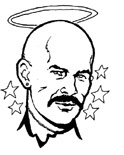
Skinheads & Rock Stars — or Saints?
ON CHOOSING HEROES WISELY
Almost every man… will be found to have… some hero or other, living or dead, … whose character he endeavors to assume, and whose performances he labours to equal. When the original is well-chosen and judiciously copied, the imitator arrives at excellences which he could never have attained without direction… — Samuel Johnson
In the 19th century Thomas Carlyle published Heroes and Hero-Worship, in which he taught that hero-worship is natural to humans: When a man is your superior, you act naturally by looking up to him and following him. Though Carlyle’s theory has distinct limitations, there is much truth in his basic insight. All men naturally seek heroes. It seems to me that this impulse arises from our primordially incomplete existence due to Original Sin. We intuitively sense our incompleteness, which results in an innate anxiety. We seek to complete ourselves — to assuage our anxiety — in various ways. We, for instance, seek knowledge from an innate sense that knowledge makes us more complete (which is why Aristotle began his Metaphysics with the words, “All men by nature desire to know”).
We also seek to complete ourselves through other people. This is not surprising because we are social beings — creatures made to be with one another and therefore beings with an instinctive attraction to one another. Our attempt to complete ourselves through other people frequently takes the form of seeking someone better, a person whose life and example give us a clue about the answers to life’s questions. When we find such a person, we have found a hero.
Hero-worship is so ingrained in our natures that if we cannot find a hero we may follow a pseudo-hero. A recent story in U.S. News & World Report about homelessness noted the growing number of homeless youth. According to the story, there are increasing numbers of radically disaffected teenagers and young adults (complete with tattoos and body-piercings — one youth had a third eye tattooed on his forehead) who deliberately choose to live on the street. They confidently say they are engaging in the “Not-Wanting-To-Do-Anything” rebellion. But even they, slack as they may be, have heroes. Many have made their way to the Berkeley and San Francisco area, seeing themselves as descendants of the Haight-Ashbury street movement of the 1960s. Professing to admire nothing, still they imitate the hippies of the Sixties who disdained the conventionalities of everyday society.
You May Also Enjoy
The current identification of the Christian life with consumerism, suburban aspirations, and a gamut of other materialistic concerns denies the incarnation — makes it incredible.
Television use is linked to a significant loss of intellectual ability in young children, increased violent behavior, and loss of morals.
I have been making some snide remarks in recent columns about the talk shows that…

